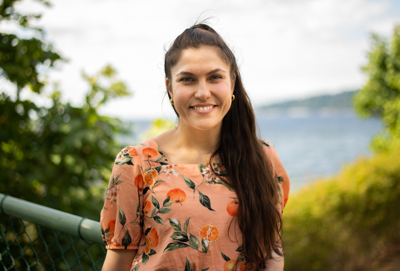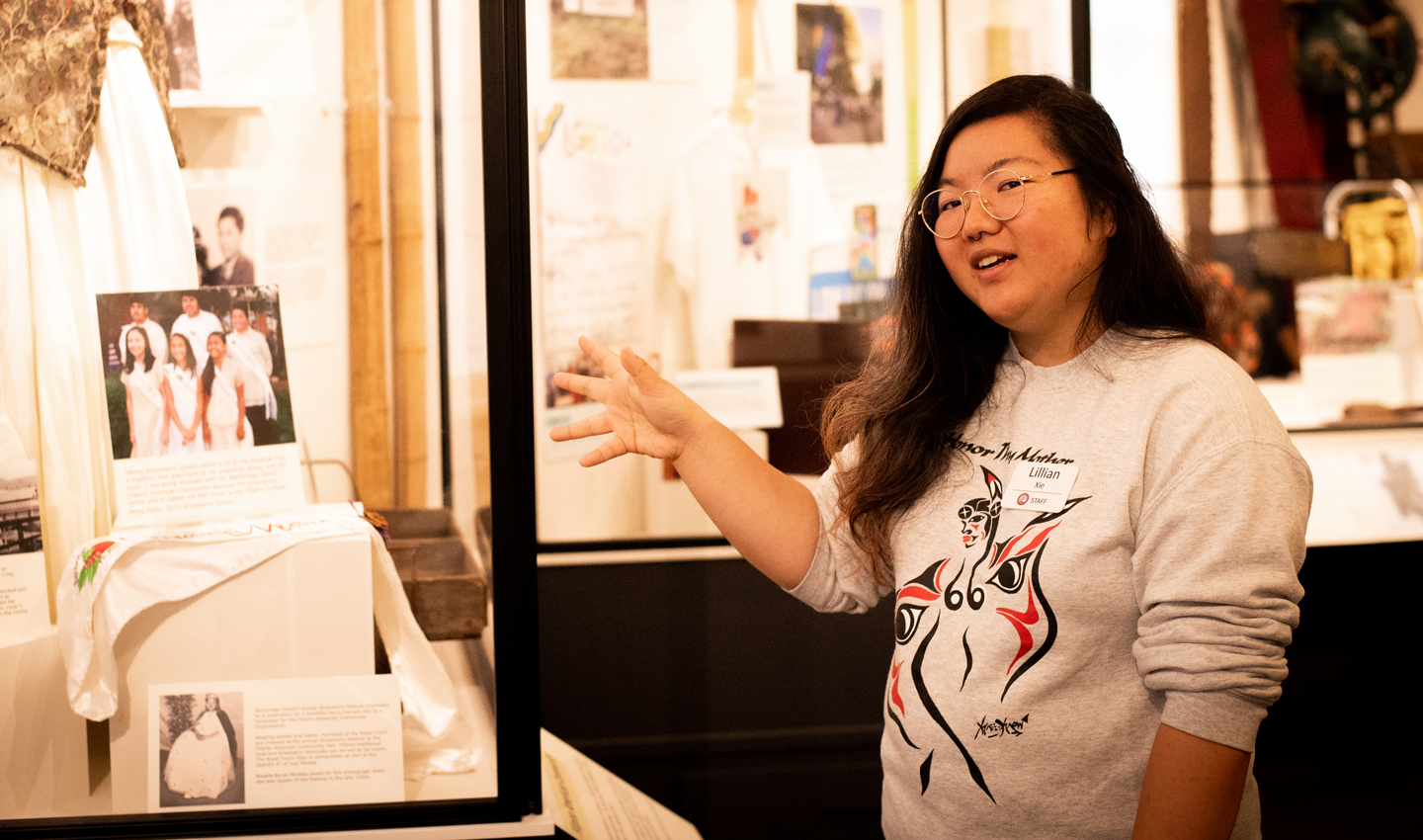Until recently, collections in the Bainbridge Island Historical Museum typically featured the island’s maritime past and lumber mills. Nothing was newer than a half-century old.
“It was still that colonial project,” said Lillian Xie, the museum’s collections manager, “a lot of white people history.”
The museum’s current exhibits paint a richer picture, including exhibits on Filipino Americans, African Americans, the Pride community and other aspects of island life. It’s the kind of transformation that students learn to lead in the University of Washington’s Museology master’s program, which is joining the Information School this fall after 51 years operating separately in the UW Graduate School.
Xie, who earned her M.A. in Museology in 2021, joined the small museum near Seattle while it was undergoing a major renovation. She oversaw the movement of 450 objects from their cramped former quarters to the museum’s new, larger space. In her role, she handles the care and logistics involved in collections and advises on exhibit design.
To broaden representation, Xie (pictured at top) said, the museum recruited advisors from 13 island communities. They acted as liaisons in choosing which objects and stories would represent the communities in the museum’s exhibits.
“It was returning the voice to the people because they’re still around and they’re totally capable of telling their ancestors’ stories and telling their own,” she said. “That was super eye-opening for me because that’s pretty much what we talked about in Museology.”
“We’ve tried to be super transparent and to really lean into this notion that museums are built on a really horrible history but that we can change them.”
Museum professionals’ responsibility to promote inclusion is at the core of Museology’s curriculum, said Teaching Professor Jessica Luke, the program director. Coursework addresses the fraught history of museums, which have long acted as repositories for wealthy people to display objects seized through colonialism.
“We’ve tried to be super transparent and to really lean into this notion that museums are built on a really horrible history but that we can change them,” Luke said.
Like the iSchool’s other graduate programs, Museology blends theoretical and practical elements. It equips students with the latest research and best practices and prepares them to consider the impact of their work in one of society’s most trusted institutions. While most graduates go on to land jobs in museums, some work in nonprofits, hospitals, higher education or the private sector.
Museology will be fully integrated into the iSchool within three years, but students are seeing immediate benefits. They can now seamlessly take classes across graduate programs in Museology, Library and Information Science, and Information Management. Bringing the program into the iSchool just makes sense, Dean Anind Dey said.
“The kind of work that goes on in museums and libraries has a lot of overlap,” he said, citing a common acronym for galleries, libraries, archives and museums – GLAM. “Clearly, people think of these as a single unit.”
Museology is a small program with three full-time faculty members: Luke and Assistant Teaching Professors Lane Eagles and Meena Selvakumar. Museology admits around 30 students each year, and those students move through the program together as a cohort.
“They spend a lot of time with each other and socialize with each other, and they become long-term professional connections,” Selvakumar said. “I don’t think they go in thinking that’s one of the things they’ll take away, but most of them take that with them.”
Selvakumar said that through their coursework and experiences in the program, Museology students tend to find which aspect of museums suits their strengths. Some might become curators, others educators or exhibit developers.
“I think by the time they leave, they know what that means for themselves and their own specific interests, strengths and skills,” she said. “It crystallizes that into something that is actionable.”

That was the case for Danielle Sakowski, ’20, who majored in archaeological studies as an undergrad. She said she started out thinking she would stick to museum collections, but that quickly changed. In the program, she got a broad view of how museums operate, including administrative functions, grant writing and community engagement.
Her interests led her to a thesis project focused on climate change engagement in museums, and that led to further projects and eventually to a job. She now works as a program manager at Environment & Culture Partners (ECP), a small nonprofit based in Tacoma that focuses on what the nonprofit and culture sector can do to address climate change.
In recent months, she has been working to help museums and other nonprofits such as zoos and aquariums measure their energy use, part of a broader effort to establish benchmarks so the cultural sector can reduce its carbon footprint.
“If they can reduce their energy use or start using clean energy, that leads to some critical money savings and potentially avenues to other funders that want to be funding this type of work in museums,” she said.
Sakowski had the kind of experience that Luke and other Museology faculty hope to see from students. The program emphasizes critical-thinking skills and prepares them for a wide range of jobs.
“We want you to better understand yourself when you come out of our program and what you’re good at and what you’re not good at, and ways to leverage those skills,” Luke said.
Read Anind Dey's dean's message about Museology joining the iSchool.
